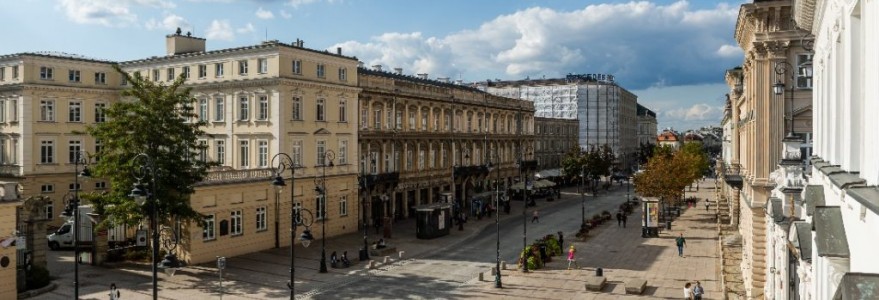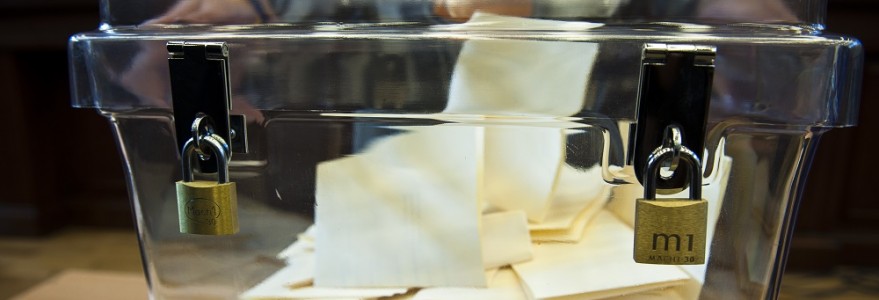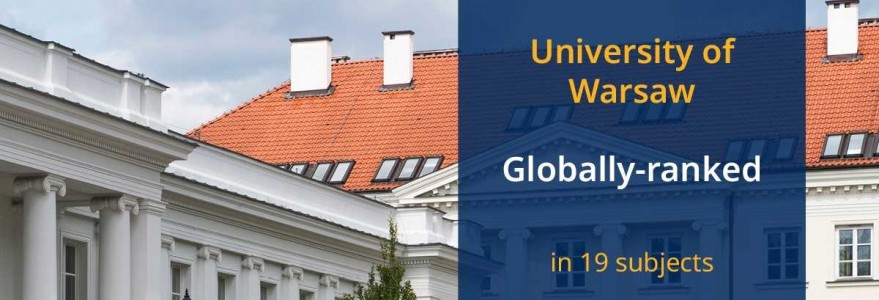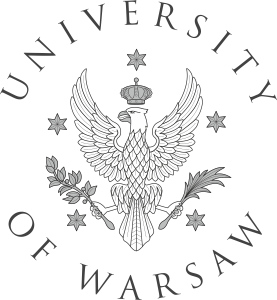05 marca 2020

We publish an announcement of the University of Warsaw rector on recommendations related to Coronavirus SARS-CoV-2 spread.
Due to the increasing number of areas where COVID-19 is spread, including Europe, the University of Warsaw authorities recommend as following:
- To postpone or, in exceptional cases, cancel all events in which people from the following countries were to participate: China, Hong Kong, South Korea, Italy, Iran and Japan (announcement of the Chief Sanitary Inspectorate for Travellers, No. 39 on 3rd March 2020). It applies to those who, within the last 14 days, visited the mentioned above countries.
- Decisions regarding postponing or cancelling other events should result from an analysis of potential decisions of participants or speakers. Due to some limitations in mobility, there might occur situations in which people who declare to participate in a given event will decide not to take part.
- To limit, to an absolute minimum, academic events (university-wide, faculty, sports activities, etc.) organised by the University of Warsaw units. It applies in particular to events gathering a large group of participants.
- To limit both national and international mobility. It refers to all groups of UW employees.
- To follow announcements of the Chief Sanitary Inspectorate.
Recommendations included in previous announcements on COVID-19 remain in force.
The University of Warsaw authorities, cooperating with the Medical University of Warsaw, are in direct contact with members of special expert team in virology, set up by the rector, Mirosław Wielgoś. Its task is to monitor risks associated with spreading COVID-19 infection.
If necessary, in the coming days, new announcements on COVID-19 will be issued.
Source: www.en.uw.edu.pl
04 marca 2020

On 3rd March, the first Electoral College meeting took place. Members of this body elected three candidates for the position of rector. On 22nd April, it will be clear who will manage the university’s activity, represent UW externally and be the superior of employees, students and doctoral candidates.
The Electoral College is, apart from the University Council of the University of Warsaw, entitled to indicate candidates for the position of rector. According to UKW, the University Electoral Committee, resolution, The Electoral College comprises 389 members. The body that consists of representatives of the University community groups, academic teachers and non-academic employees (311), doctoral candidates (5), students (73) elected at faculties and in constituencies. The Electoral College of the University elects both the UW rector, and members of the Senate.
On 3rd March, the electors, in a secret ballot, indicated candidates. Each elector had the right to nominate two candidates in the candidate indication vote. The nomination did not require the candidate’s consent. The candidates nominated in the indication vote by at least 10% of the voters passed to the proper vote, after having submitted their written consent to stand for election and, take the position if elected to the University Electoral Committee.
Candidates for the UW rector indicated by the Electoral College:
– Prof. Alojzy Nowak (221)
– Prof. Andrzej Tarlecki (146)
– Prof. Paweł Strzelecki (96)
Another bodyauthorised to nominate candidates for the UW rector is the University Council. According to the University of Warsaw Statute, the University Council nominates two candidates. The Council needs to put forward its candidates for the rector by 11th March.
The UW Senate meeting aimed togive its opinion on each candidate (both indicated by the Electoral College and by the University Council) will be held on 18th March. On 30th March, the University Electoral Committee organises a pre-election meeting with all candidates for the rector. All members of the University of Warsaw community can take part in it.
On 22nd April, there will be a proper vote, and the UW rector will be elected.
Source: www.en.uw.edu.pl

19 study programmes run at UW have been listed in the latest edition of the QS World University Rankings by Subject.
The QS World University Rankings by Subject is an annual comparison of the world’s higher education institutions in a range of popular subject areas. It is based on academic reputation, employer reputation, citations per paper, and H-Index (a way of measuring both the productivity and impact of the published work of a scientist or scholar).
To compile these rankings authors analysed the performance of 13 138 individual university programmes, taken by students at 1 368 universities which can be found in 83 locations across the world.
The 2020 edition of the ranking features 48 academic disciplines and five broad Faculty Areas: Arts & Humanities, Engineering & Technology, Life Sciences & Medicine, Natural Sciences, and Social Sciences & Management. 19 programmes provided by the UW have been recognised in this year’s QS World University Rankings by Subject. The number of the UW programmes in the ranking is growing. In the previous year there were 17 programmes. The list below presents UW subjects which were ranked in the QS World University Rankings by Subject in 2020.
Subjects – 101-150:
- Archaeology
- Modern Languages
- Philosophy
Subjects – 151-200:
- Politics and International Studies
- History
- Linguistics
- Communication & Media Studies
- Law
- Geography
- Physics & Astronomy
Subjects – 201-250:
- English Language & Literature
- Sociology
- Mathematics
Subjects – 251-300:
- Psychology
- Computer science and Information Systems
- Economics and Econometrics
Subjects – 301-350:
- Chemistry
- Biological Sciences
Subjects – 401-450:
- Business & Management Studies
View the full results >>
Source: www.en.uw.edu.pl
02 marca 2020
The Centre of New Technologies invites to a seminar by
Prof. Józef Dulak
Head of Department of Medical Biotechnology, Faculty of Biochemistry, Biophysics and Medical Biotechnology, Jagiellonian University, Kraków
Title: New mechanisms of muscles injury and repair
Date: March 6th, 2020 (Friday)
Time: 12:00 p.m.
Venue: Centre of New Technologies, Banacha 2C, Lecture Hall 0142 (Ground floor)
Host: prof. Krzysztof Kobielak
Skeletal muscles efficiently regenerate after injury while heart does not and destroyed cardiomyocytes are replaced by the fibrotic scar. Regeneration of skeletal muscles is driven by the satellite cells, the bona fide stem cells, which upon activation start to proliferate and differentiate, fuse and finally form the muscular fibers. Impairment of muscle regeneration develops with age and is also associated with the inherited muscular dystrophies. Among them the Duchenne muscular dystrophy (DMD) is the most common, still unfortunately incurable. The lack of dystrophin results in the aggravated muscles injury which do not efficiently regenerate and the affected boys loose ambulation in the early teenage and die due to heart failure mostly in the 3rd decade of life.
Restoration of dystrophin in muscles and heart is an obvious but very challenging and so far, not successful way to treat DMD. However, modulation of inflammation linked with muscle and heart damage can ameliorate disease conditions. We have shown that disturbance of muscle regeneration is linked with impairment of satellite cells differentiation and the lack of additional genes can either ameliorate or aggravate the absence of dystrophin. We revealed that different pathways, including Nrf2, heme oxygenase-1 and mir-378 are promising targets to modulate disease progression through influence on satellite cells, inflammation, fibrosis, angiogenesis and metabolism. Employing on these mechanisms and on the induced pluripotent stem cells-based technology offers the chance for better understanding of heart failure in DMD patients and development of treatments approaches relying on iPSC-derived cardiomyocytes and pharmacological compounds.
Supported by Maestro (2013-2018 and 2019-2024), OPUS (2014-2017) and Harmonia (2016-2019) grants from the National Science Centre.
27 lutego 2020
PhD Student position is available in Grela’s group in the International Training Network (ITN) and more specifically a European Joint Doctorate (EJD), funded by the European Commission through the Marie Sklodowska-Curie Action (MSCA), entitled „Coordination Chemistry Inspires Molecular Catalysis” (CCIMC). Project title: „Immobilization of NHC’s ligands in Janus Dendrimers. Catalysis in green solvents”. Supervisors: Prof. Karol Grela and Dr. Rosa María Sebastián. Deadline for applications: 31 March 2020. For more info see >> pdf
High paying position for adjunct (post doc) who will develop new models and software in a project at borderline of crystallography and computational chemistry entitled „Advancing quantum crystallography for better insight into structure and properties of crystals” financed by National Science Centre (NCN) is open for application. Project leader: Prof. dr hab. Krzysztof Woźniak. Deadline for applications: 5 April 2020. For more info see >> pdf

The Ministry of Foreign Affairs of the Republic of Poland and the Chief Sanitary Inspectorate have issued announcements in which they advise against travelling to 11 municipalities in Italy which are being quarantined due to the occurrence of Coronavirus SARS-CoV-2 (in Lombardy: Codogno, Castiglione d’Adda, Casalpusterlengo, Fombio, Maleo, Somaglia, Bertonico, Terranova dei Passerini, Castelgerundo, San Fiorano; in Veneto: Vò Euganeo, Padua).
Following the recommendations of the Ministry and the Inspectorate, the University of Warsaw advises to:
- cancel trips of employees, students and doctoral students to the 11 Italian municipalities in quarantine;
- contact UW Italian partners from the 11 municipalities in quarantine with a suggestion to postpone or cancel visits of employees, students and doctoral students to the University of Warsaw.
The International Relations Office (IRO) is in constant individual contact with students and staff planning visits to the Italian partner universities under the Erasmus programme. IRO, together with the Foundation for the Development of the Education System (National Erasmus Agency in Poland), is in the process of establishing procedures regulating possible shortening or cancellation of mobilities.
At the same time, due to the dynamic nature of the situation, we recommend following the announcements for travellers in connection with the spread of Coronavirus SARS-CoV-2, posted on the websites of:
All those who are planning trips to Italian regions which are not in quarantine are also advised to follow the announcements of the Italian sanitary services.
Decisions regarding temporary absence from the University of persons who returned to Poland from countries where Coronavirus cases occurred shall be taken individually:
- in the case of staff – by heads of units (deans of faculties and heads of other units)
- in the case of students – by heads of didactic units (vice-deans for student affairs and deputy heads for student affairs).
All those who are planning trips to other countries where Coronavirus cases have occurred are advised to follow the announcements on the website of the Chief Sanitary Inspectorate and the recommendations for travellers on the website of the Ministry of Foreign Affairs, and to take safety precautions, as described above.
At the same time, we remind you of the recommendations of the World Health Organization on the prevention of coronavirus infections (https://www.who.int/emergencies/diseases/novel-coronavirus-2019/advice-for-public).
WHO experts recommend:
- “Frequently clean hands by using alcohol-based hand rub or soap and water;
- When coughing and sneezing cover mouth and nose with flexed elbow or tissue – throw tissue away immediately and wash hands;
- Avoid close contact with anyone who has fever and cough;
- If you have fever, cough and difficulty breathing seek medical care early and share previous travel history with your health care provider;
- When visiting live markets in areas currently experiencing cases of novel coronavirus, avoid direct unprotected contact with live animals and surfaces in contact with animals;
- The consumption of raw or undercooked animal products should be avoided. Raw meat, milk or animal organs should be handled with care, to avoid cross-contamination with uncooked foods, as per good food safety practices.”
Source: www.en.uw.edu.pl
Project Manager – prof. Karol Grela (Head of Organometallic Synthesis Laboratory, Faculty of Chemistry, University of Warsaw) is looking for candidates to work in a scientific project: „Making the Impossible Possible: Macrocyclisation of Unbiased Dienes at High Concentration by Ring-Closing Metathesis”, programme Opus supported by National Science Centre positions: Post-Doc (2) – Assistant in a group of research workers, operating in the field of exact and natural sciences. Deadline for applications: 28 March 2020. For more info see >> pdf
25 lutego 2020
META 2020, the 11th International Conference on Metamaterials, Photonic Crystals and Plasmonics
University of Warsaw, Warsaw, Poland
July 20 – 23, 2020
https://metaconferences.org
Dear Colleague,
The 11th International Conference on Metamaterials, Photonic Crystals and Plasmonics (META 2020), the premier conference for Nanophotonics and Advanced Electromagnetics Materials, will be held in the University of Warsaw – Poland, from 20 to 23 July 2020.
Abstract submission is open, the extended deadline for submitting Abstracts to META 2020 is March 16, 2020:
https://metaconferences.org/ocs/index.php/META20/index/pages/view/abstracts
Plenary Speakers:
1. Robert W. Boyd, University of Ottawa, Canada
2. Nader Engheta, University of Pennsylvania, USA
3. Federico Capasso, Harvard University, USA
4. Maiken H. Mikkelsen, Duke University, USA
5. Masaya Notomi, NTT Basic Research Labs., Japan
6. Deirdre OCarroll, Rutgers University, USA
7. DGeorge C. Schatz, Northwestern University, USA
8. Vladimir M. Shalaev, Purdue University, USA
Conference Tutorials:
Following the great success of the first edition of META tutorials in Lisbon, META 2020 will feature several technical tutorials instructed by leading experts on various topics of interest to the META community (free of charge for the conference attendees).
Tutorial Instructors:
1. Ali Adibi, Georgia Institute of Technology, USA
2. Harry Atwater, California Institute of Technology, USA
3. Federico Capasso, Harvard University, USA
Important dates:
16 March 2020: Abstract Submission Extended Deadline, 23:00 (PST)
24 April 2020: Early Bird Registration Deadline
2 June 2020: Advanced Registration Deadline
8 June 2020: Full-papers Submission Deadline, 23:00 (PST)
Further details on META 2020 can be found on the conference website:
https://metaconferences.org
We look forward to meeting you at META in Warsaw!
Sincerely yours,
META 2020 Conference Chairs:
Prof. Dorota Pawlak, Institute of Electronic Materials Technology, Poland
Prof. Andrzej Kudelski, University of Warsaw, Poland
Prof. Said Zouhdi, Paris-Saclay University, France





